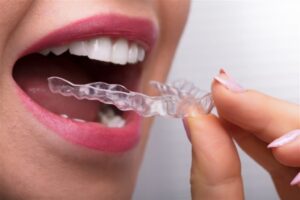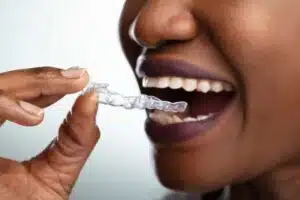Caring for Your Invisalign Aligners: A Complete Maintenance Guide
Caring for Your Invisalign Aligners: A Complete Maintenance Guide
Invisalign aligners are a popular choice for achieving straighter teeth without the hassle of traditional braces. Their clear design and removability make them convenient and discreet, but they require consistent care to maintain their quality and effectiveness. This guide explains everything you need to know to keep your aligners clean, clear, and functioning well throughout your treatment.
Rinse Your Aligners Regularly
Every time you take your aligners out, rinse them with lukewarm water. This simple step prevents saliva, food particles, and bacteria from sticking to the surface. Always use lukewarm water—never hot or boiling water, as it can warp the aligners.
Rinsing also keeps your aligners fresh throughout the day. Even if you don’t have time for a full clean, rinsing them regularly reduces bacteria buildup and helps maintain their transparency.
Brush Your Aligners Daily
A daily brushing routine is essential for keeping your aligners free of stains and odors. Use a soft-bristled toothbrush and mild liquid soap. Gently scrub the inside and outside of the aligners, ensuring you reach every surface. Avoid using toothpaste, as it often contains abrasive particles that can leave tiny scratches on the aligners.
After brushing, rinse thoroughly with water to remove any soap residue. Make this part of your morning and evening oral care routine to ensure consistency.
Soak Your Aligners
In addition to daily cleaning, soak your aligners a few times a week for a deeper clean. Soaking removes plaque and stubborn stains that regular brushing might miss. Use Invisalign cleaning crystals or a denture-cleaning tablet dissolved in water.
Allow the aligners to soak for about 15–30 minutes, depending on the product’s instructions. After soaking, rinse them thoroughly to remove any residue from the cleaning solution.
Practice Good Oral Hygiene
Your aligners will only stay clean if your teeth and gums are clean too. Brush your teeth after every meal to remove food particles that could get trapped between your teeth and the aligners. Neglecting this can lead to bacteria buildup, unpleasant smells, and even cavities.
Floss daily to clean between your teeth, and use a fluoride mouthwash for extra protection against bacteria. A clean mouth keeps your aligners fresh and ensures better overall oral health.
Remove Aligners Before Eating or Drinking
Always take your aligners out before eating or drinking anything other than water. Food particles and colored beverages can easily stain the aligners or leave behind residues that are hard to clean.
Eating with your aligners on can also cause them to crack or become misshapen, affecting their ability to straighten your teeth. Keep the aligners in their case when you remove them to avoid accidental damage or loss.
Store Aligners in Their Case
Proper storage is critical when your aligners aren’t in your mouth. Use the protective case provided with your aligners every time you take them out. Leaving them exposed increases the risk of losing them or contaminating them with bacteria from surfaces.
Keep the case clean by washing it regularly with soap and water. This helps prevent bacteria from transferring to your aligners when they’re stored.
Handle Aligners with Care
While aligners are durable, they are not indestructible. Handle them gently to avoid cracks or deformation. Always use both hands to remove or insert the aligners, and avoid twisting or bending them excessively.
Never bite down to force them into place, as this can damage the aligners or hurt your teeth. If you struggle to insert them properly, check with your dentist for advice.
Monitor Aligners for Damage
Regularly inspect your aligners for signs of wear or damage. Cracks, rough edges, or a poor fit can indicate the aligners are no longer functioning as they should. Damaged aligners may fail to move your teeth correctly and could even cause discomfort.
Contact your dentist immediately if you notice damage. They can provide a replacement or adjust your treatment plan as needed.
Avoid Staining Your Aligners
Staining is a common concern with clear aligners. Drinking coffee, tea, red wine, or other pigmented beverages can leave discoloration on the aligners. Smoking is another major cause of staining and should be avoided during Invisalign treatment.
If staining does occur, soaking the aligners in a safe cleaning solution can help restore their clarity. However, prevention is always better than cure, so remove aligners before consuming anything that could stain them.
Stick to Your Aligner Schedule
Adhering to your aligner schedule is just as important as cleaning them. Invisalign aligners are designed to be worn for 20–22 hours daily, and failing to do so can delay your treatment.
Follow the timeline for switching to your next set of aligners, usually every one to two weeks. Changing aligners too early or too late can affect the alignment process.
Clean Your Aligner Case
Your aligner case is as important to clean as the aligners themselves. Bacteria can easily transfer from the case to your aligners if it isn’t washed regularly. Use warm water and mild soap to clean the case daily, and let it air dry before placing your aligners inside.
A clean case ensures your aligners stay hygienic even when not in use.
Address Bad Breath
If you notice bad breath while wearing aligners, it’s often a sign of poor cleaning habits. Improve your oral hygiene routine by brushing your teeth more thoroughly, flossing daily, and rinsing with an antibacterial mouthwash.
Regularly cleaning your aligners and soaking them as needed also helps eliminate odours caused by trapped bacteria.
Attend Regular Dentist Appointments
Your dentist plays a crucial role in your Invisalign journey. Regular check-ups ensure the aligners fit properly and your teeth are moving as expected. Your dentist can also spot issues early, such as damage to the aligners or oral health concerns.
Stick to the appointment schedule your dentist provides, and don’t hesitate to ask questions about your treatment.
Avoid Common Mistakes
Several habits can harm your aligners or prolong your treatment. Don’t leave them exposed on countertops, as this exposes them to bacteria. Avoid biting your aligners into place or using harsh cleaning products that could damage them.
These small mistakes can impact the effectiveness of your treatment, so stay mindful of how you handle your aligners.
Consistency Is Key
Caring for Invisalign aligners requires commitment. Building a routine makes maintenance easier and ensures your aligners stay in excellent condition. Start each day by brushing your teeth and aligners, and end with a similar routine before bed.
Taking these steps keeps your aligners clear, odor-free, and effective. Proper care also ensures your treatment progresses smoothly, helping you achieve the straight, confident smile you want.





